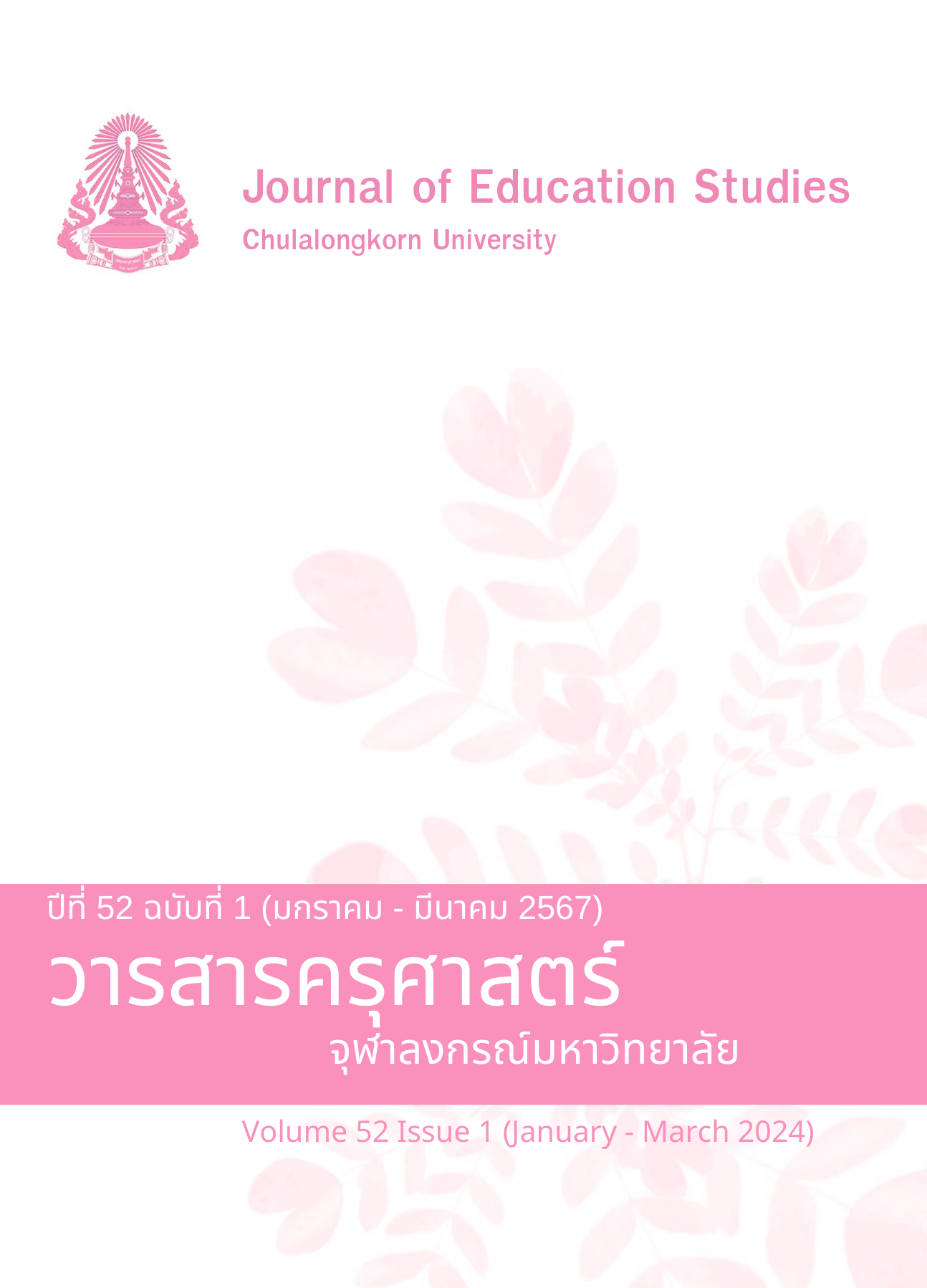Study of the Competencies of Cooperative Education Students: A Comparison among Employers, Instructors, and Cooperative Education Students from Prince of Songkla University, Phuket Campus
DOI:
https://doi.org/10.14456/educu.2024.16Keywords:
cooperative and work integrated education: CWIE, corporations, instructors, cooperative education students, competencyAbstract
Prince of Songkla University, Phuket Campus, has a policy to promote cooperative education and work-integrated learning, emphasizing the importance of sending students to obtain practical work experience in order to prepare them for the real world. The research objective of this paper is 1) to analyze the evaluation results of cooperative education student from the perspectives of the employers, instructors, and cooperative education students, and 2) to compare three different perspectives on the competencies of cooperative education students. Data was collected by gathering student performance questionnaires from these three groups during the academic year 2022. Questionnaires were verified by professionals and responded by 104 employers, 64 instructors, and 164 students. Statistical analysis was conducted, including frequency distribution, mean calculation, and standard deviation. The research findings indicate that, overall, the cooperative education students' competencies were perceived to be the highest by the instructors, less high by the employers, and lowest by the students themselves. The competencies that showed the most significant development across all perspectives were self-development in soft skills, hard skills, ethical and moral behavior, and adherence to organizational discipline. The area that showed most room for improvement, as perceived by instructors, was in the students' ability to produce comprehensive and advanced reports. There was a consensus between the employers and the instructors that students had stronger development in hard skills than in soft skills. Therefore, it is recommended that the curriculum should focus more in future on enhancing students' soft skills, to better meet the expectations of employers by developing graduates with higher competency and greater potential.
References
ภาษาไทย
กมลวรรณ แสงทอง และ ณัฐพงศ์ ทองเทพ. (2566). ศักยภาพของนักศึกษาสหกิจศึกษาในมุมมองของสถานประกอบการต่อการพัฒนางานสหกิจศึกษาและการศึกษาเชิงบูรณาการกับการทำงาน กรณีศึกษา มหาวิทยาลัยสงขลานครินทร์ วิทยาเขตภูเก็ต. Journal of Information and Learning, 34(3), 46-61. https://doi.org/10.14456/jil.2023.33
กระทรวงการอุดมศึกษา วิทยาศาสตร์ วิจัยและนวัตกรรม. (2565, 18 มกราคม). โครงการส่งเสริมการจัดสหกิจศึกษาและการศึกษาเชิงบูรณาการกับการทำงาน. กระทรวงการอุดมศึกษา วิทยาศาสตร์ วิจัยและนวัตกรรม. https://www.mhesi.go.th/index.php/flagship-project/6820-CWIE.html
กระทรวงการอุดมศึกษา วิทยาศาสตร์ วิจัยและนวัตกรรม. (2565, 13 ธันวาคม). กรอบนโยบายและยุทธศาสตร์การอุดมศึกษา วิทยาศาสตร์ วิจัยและนวัตกรรม พ.ศ. 2566 - 2570. กระทรวงการอุดมศึกษา วิทยาศาสตร์ วิจัยและนวัตกรรม (mhesi).
https://www.mhesi.go.th/index.php/all-media/book-ministry/8310-2022-12-13-06-27-40.html
คณะกรรมการมาตรฐานการอุดมศึกษา. (2565). หลักเกณฑ์และแนวปฏิบัติเพื่อส่งเสริมการจัดหลักสูตรสหกิจศึกษาและการศึกษาเชิงบูรณาการกับการทำงาน พ.ศ.2565. คณะกรรมการมาตรฐานการอุดมศึกษา.
จินดารัตน์ โพธิ์นอก. (2561, 28 พฤศจิกายน). องค์ความรู้ภาษา-วัฒนธรรม. สำนักงานราชบัณฑิตยสภา. http://legacy.orst.go.th/wp-content/uploads/2018/12/11282561-สมรรถนะ.pdf
ชูศรี วงศ์รัตนะ. (2553). เทคนิคการใช้สถิติเพื่อการวิจัย. เทพเนรมิตรการพิมพ์.
มหาวิทยาลัยสงขลานครินทร์ วิทยาเขตภูเก็ต. (2565). คณะและสาขาที่เปิดสอน. มหาวิทยาลัยสงขลานครินทร์ วิทยาเขตภูเก็ต (psu). https://www.psu.ac.th/phuket/admissions/undergraduate/
มหาวิทยาลัยสงขลานครินทร์ วิทยาเขตภูเก็ต. (2566). EdPEx. มหาวิทยาลัยสงขลานครินทร์ วิทยาเขตภูเก็ต. https://info261518.wixsite.com/edpex/copy-of-forwritter
วรรณะ วิจิตร และคณะ. (2562, กรกฎาคม). ความพึงพอใจของสถานประกอบการที่มีต่อนักศึกษาสหกิจศึกษา มหาวิทยาลัยหาดใหญ่ [Paper presentation], การประชุมหาดใหญ่วิชาการระดับชาติและนานาชาติ, สงขลา, ประเทศไทย.
วันพิชิต ชินตระกูลชัย. (2564, 20 กันยายน). ข้อมูลส่วนบุคคล ข้อมูลอ่อนไหว คืออะไร มีกี่ประเภท มีอะไรบ้าง?. openpdpa. https://openpdpa.org/personal-data-type/
วิจิตร ศรีสอ้าน. (2565). โมดุล 1 หลักการ แนวคิด นโยบาย และกฎหมาย สหกิจศึกษาและการศึกษาเชิงบูรณาการกับการทำงาน. กระทรวงการอุดมศึกษา วิทยาศาสตร์ วิจัยและนวัตกรรม.
สมาคมสหกิจศึกษาไทย. (2552). มาตรฐานและการประกันคุณภาพการดำเนินงานสหกิจศึกษา. สมาคมสหกิจศึกษาไทย.
สำนักงานคณะกรรมการข้าราชการพลเรือน. (2561, 30 มกราคม). การพัฒนาสมรรถนะหลัก (สำหรับข้าราชการใหม่). สำนักงานคณะกรรมการข้าราชการพลเรือน. https://www.ocsc.go.th/sites/default/files/attachment/page/aptitude_development.pdf
ภาษาอังกฤษ
Khampirat, B. (2016). Developing Global Standards Framework and Quality Integrated Models for Cooperative and Work-Integrated Education Programs. Asia-Pacific Journal of Cooperative Education, 17(4), 349-362. https://eric.ed.gov/?id=EJ1131541
Karsten, E. Z. (2018). Cooperative education in the Asian region. (1st ed.). Routledge. https://doi.org/10.4324/9781315402024
Marin-Zapata et al., (2022). Soft skills, do we know what we are talking about?. Rev Manag Sci 16. https://doi.org/10.1007/s11846-021-00474-9
Schneider, K. (2019). What Does Competence Mean?. (14th ed.). Psychology.
https://doi.org/10.4236/psych.2019.1014125
United Nations. (2010). Un competency development – A practical guide. O¬ffice of Human Resource Management Department of Management United Nations. https://hr.un.org/sites/hr.un.org/files/Un_competency_development_guide.pdf
Downloads
Published
How to Cite
Issue
Section
License

This work is licensed under a Creative Commons Attribution-NonCommercial-NoDerivatives 4.0 International License.




